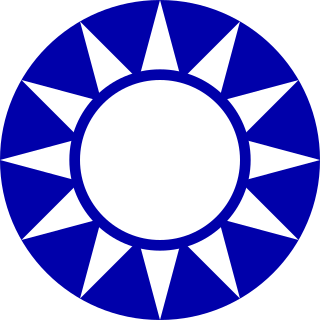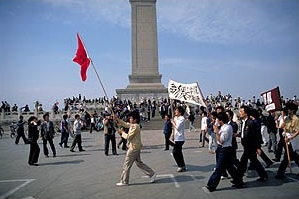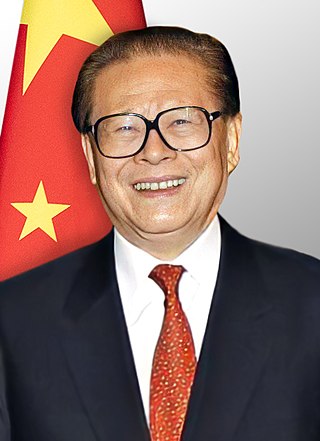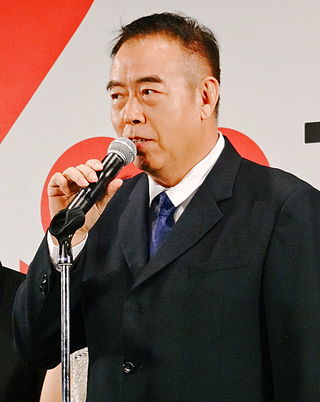
The Korean War was fought between North Korea and South Korea from 1950 to 1953. The war began on 25 June 1950 when North Korea invaded South Korea following clashes along the border and rebellions in South Korea. North Korea was supported by China and the Soviet Union while South Korea was supported by the United States and allied countries. The fighting ended with an armistice on 27 July 1953.

The Kuomintang (KMT), also referred to as the Guomindang (GMD) or the Chinese Nationalist Party, is a major political party in the Republic of China, initially on the Chinese mainland and in Taiwan after 1949. It was the sole party in China during the Republican Era from 1928 to 1949, when most of the Chinese mainland was under its control. The party retreated from the mainland to Taiwan on 7 December 1949, following its defeat in the Chinese Civil War. Chiang Kai-shek declared martial law and retained its authoritarian rule over Taiwan under the Dang Guo system until democratic reforms were enacted in the 1980s and full democratization in the 1990s. In Taiwanese politics, the KMT is the dominant party in the Pan-Blue Coalition and primarily competes with the rival Democratic Progressive Party (DPP). It is currently the largest opposition party in the Legislative Yuan. The current chairman is Eric Chu.

Marco Polo was a Venetian merchant, explorer and writer who travelled through Asia along the Silk Road between 1271 and 1295. His travels are recorded in The Travels of Marco Polo, a book that described to Europeans the then mysterious culture and inner workings of the Eastern world, including the wealth and great size of the Mongol Empire and China in the Yuan Dynasty, giving their first comprehensive look into China, Persia, India, Japan and other Asian cities and countries.

Opium is dried latex obtained from the seed capsules of the opium poppy Papaver somniferum. Approximately 12 percent of opium is made up of the analgesic alkaloid morphine, which is processed chemically to produce heroin and other synthetic opioids for medicinal use and for the illegal drug trade. The latex also contains the closely related opiates codeine and thebaine, and non-analgesic alkaloids such as papaverine and noscapine. The traditional, labor-intensive method of obtaining the latex is to scratch ("score") the immature seed pods (fruits) by hand; the latex leaks out and dries to a sticky yellowish residue that is later scraped off and dehydrated. The word meconium historically referred to related, weaker preparations made from other parts of the opium poppy or different species of poppies.

The Qing dynasty, officially the Great Qing, was a Manchu-led imperial dynasty of China and the last orthodox dynasty in Chinese history. It emerged from the Later Jin dynasty founded by the Jianzhou Jurchens, a Tungusic-speaking ethnic group who unified other Jurchen tribes to form a new "Manchu" ethnic identity. The dynasty was officially proclaimed in 1636 in Manchuria. It seized control of Beijing in 1644, then later expanded its rule over the whole of China proper and Taiwan, and finally expanded into Inner Asia. The dynasty lasted until 1912 when it was overthrown in the Xinhai Revolution. In orthodox Chinese historiography, the Qing dynasty was preceded by the Ming dynasty and succeeded by the Republic of China. The multiethnic Qing empire lasted for almost three centuries and assembled the territorial base for modern China. It was the largest imperial dynasty in the history of China and in 1790 the fourth-largest empire in world history in terms of territorial size. With 419,264,000 citizens in 1907, it was the world's most populous country at the time.

Taiwan, officially the Republic of China (ROC), is a country in East Asia, at the junction of the East and South China Seas in the northwestern Pacific Ocean, with the People's Republic of China (PRC) to the northwest, Japan to the northeast, and the Philippines to the south. The territories controlled by the ROC consist of 168 islands, with a combined area of 36,193 square kilometres (13,974 sq mi). The main island of Taiwan, also known as Formosa, has an area of 35,808 square kilometres (13,826 sq mi), with mountain ranges dominating the eastern two-thirds and plains in the western third, where its highly urbanised population is concentrated. The capital, Taipei, forms along with New Taipei City and Keelung the largest metropolitan area of Taiwan. Other major cities include Taoyuan, Taichung, Tainan, and Kaohsiung. With around 23.9 million inhabitants, Taiwan is among the most densely populated countries in the world.

The Han dynasty was an imperial dynasty of China, established by Liu Bang and ruled by the House of Liu. The dynasty was preceded by the short-lived Qin dynasty and a warring interregnum known as the Chu–Han contention, and it was succeeded by the Three Kingdoms period. The dynasty was briefly interrupted by the Xin dynasty established by usurping regent Wang Mang, and is thus separated into two periods—the Western Han and the Eastern Han (25–220 AD). Spanning over four centuries, the Han dynasty is considered a golden age in Chinese history, and it has influenced the identity of the Chinese civilization ever since. Modern China's majority ethnic group refers to themselves as the "Han people", the Sinitic language is known as "Han language", and the written Chinese is referred to as "Han characters".

The Tiananmen Square protests, known in Chinese as the June Fourth Incident, were student-led demonstrations held in Tiananmen Square, Beijing during 1989. In what is known as the Tiananmen Square Massacre, or in Chinese the June Fourth Clearing or June Fourth Massacre, troops armed with assault rifles and accompanied by tanks fired at the demonstrators and those trying to block the military's advance into Tiananmen Square. The protests started on 15 April and were forcibly suppressed on 4 June when the government declared martial law and sent the People's Liberation Army to occupy parts of central Beijing. Estimates of the death toll vary from several hundred to several thousand, with thousands more wounded. The popular national movement inspired by the Beijing protests is sometimes called the '89 Democracy Movement or the Tiananmen Square Incident.

Jiang Zemin was a Chinese politician who served as general secretary of the Chinese Communist Party (CCP) from 1989 to 2002, as chairman of the Central Military Commission from 1989 to 2004, and as president of China from 1993 to 2003. Jiang was paramount leader of China from 1989 to 2002. He was the core leader of the third generation of Chinese leadership, one of only four core leaders alongside Mao Zedong, Deng Xiaoping and Xi Jinping.

Yao Ming is a Chinese basketball executive and former professional player. He played for the Shanghai Sharks of the Chinese Basketball Association (CBA) and the Houston Rockets of the National Basketball Association (NBA). Yao was selected to start for the Western Conference in the NBA All-Star Game eight times, and was named to the All-NBA Team five times. During his final season, he was the tallest active player in the NBA, at 2.29 m.

Chen Kaige is a Chinese film director and a leading figure of the fifth generation of Chinese cinema. His films are known for their visual flair and epic storytelling. Chen won the Palme d'Or at 1993 Cannes Film Festival and the International Federation of Film Critics (FIPRESCI) Award in 1993 for directing Farewell My Concubine.

The China national football team represents the People's Republic of China in international association football and is governed by the Chinese Football Association.

The Great Wall of China is a series of fortifications that were built across the historical northern borders of ancient Chinese states and Imperial China as protection against various nomadic groups from the Eurasian Steppe. Several walls were built from as early as the 7th century BC, with selective stretches later joined by Qin Shi Huang (220–206 BC), the first emperor of China. Little of the Qin wall remains. Later on, many successive dynasties built and maintained multiple stretches of border walls. The best-known sections of the wall were built by the Ming dynasty (1368–1644).

The FIBA Asia Cup is an international basketball tournament which takes place every four years between the men's national teams of Asia and Oceania.
Yang Yu is an Olympic medal-winning swimmer from the People's Republic of China. She became part of the Chinese national swimming team in 1999, and competed for Team China at the 2008 Summer Olympics.
Xu Yanwei is an Olympic medal-winning swimmer from the People's Republic of China, who became part of the Chinese national swimming team in 2000. She competed at the 2004 Olympic Games in Athens.

The Chinese Taipei women's national volleyball team is the women's national volleyball team of Republic of China (Taiwan). Controlled by Chinese Taipei Volleyball Association, it represents the country in international competitions and friendly matches.

The Chinese Taipei national rugby union team represents the Republic of China (Taiwan) in international rugby union. Chinese Taipei have yet to make their debut at the Rugby World Cup, but have attempted to qualify since Wales 1999.
Vietnam under Chinese rule or Bắc thuộc refers to four historical periods when several portions of modern-day Vietnam was under the rule of various Chinese dynasties. Bắc thuộc in Vietnamese historiography is traditionally considered to have started in 111 BC, when the Han dynasty conquered Nanyue and lasted after the fall of the Tang dynasty in the 10th century. A fourth, relatively brief, 20-year rule by the Ming dynasty during the 15th century is usually excluded by historians in their discussion of the main, almost continuous, period of Chinese rule from 111 BC to 939 AD. These periods are largely modern reconstructions, however, and are often twisted to serve various nationalist and irredentist causes in China, Vietnam, and other countries.

The Ming treasure voyages were the seven maritime expeditions undertaken by Ming China's treasure fleet between 1405 and 1433. The Yongle Emperor ordered the construction of the treasure fleet in 1403. The grand project resulted in far-reaching ocean voyages to the coastal territories and islands in and around the South China Sea, the Indian Ocean, and beyond. Admiral Zheng He was commissioned to command the treasure fleet for the expeditions. Six of the voyages occurred during the Yongle reign, while the seventh voyage occurred during the Xuande reign. The first three voyages reached up to Calicut on India's Malabar Coast, while the fourth voyage went as far as Hormuz in the Persian Gulf. In the last three voyages, the fleet traveled up to the Arabian Peninsula and East Africa.

















